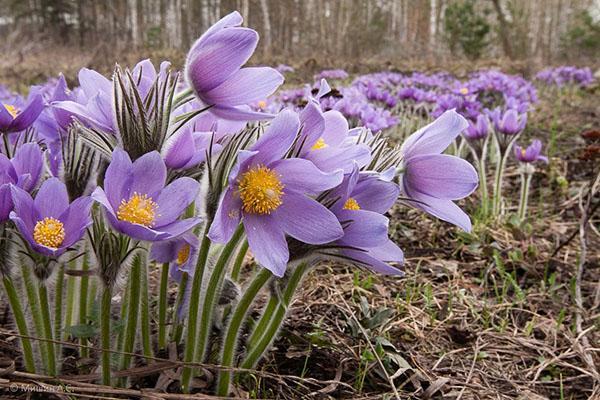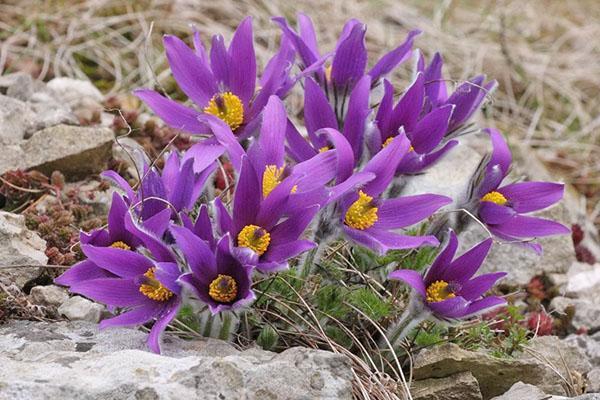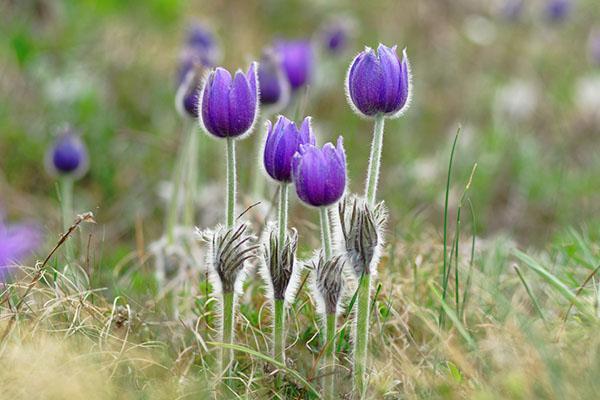Choosing the best types of lumbago for a country flower bed
 The types of lumbago that are found in nature are distinguished by unique flowers of bright colors. It is an unusual plant that appears immediately after the snow melts. Outwardly, lumbago is very similar to tulips, which delights many gardeners.
The types of lumbago that are found in nature are distinguished by unique flowers of bright colors. It is an unusual plant that appears immediately after the snow melts. Outwardly, lumbago is very similar to tulips, which delights many gardeners.
Types of lumbago: description of plants

Stems and leaves are covered with fine villi. A small snowdrop grows. You can meet dream grass throughout the Northern Hemisphere.
Some varieties of lumbago are listed in the Red Book.
Spring lumbago
 In nature, this species can be found in the Karelian Isthmus, in the Alpine mountains, in Jutland, Finland and on the Scandinavian Peninsula.
In nature, this species can be found in the Karelian Isthmus, in the Alpine mountains, in Jutland, Finland and on the Scandinavian Peninsula.
Spring lumbago grows, up to a maximum of 30 cm in height. The stems are slightly curved. The leaves are elongated. They appear immediately after flowering. Single buds. When loose, they reach 4 cm in diameter. Outwardly, the flowers have a purple hue, but inside they are white. The buds bloom in the second part of May. You can observe flowering for 25 days.
Lumbago golden
 The variety is distinguished by large and bright flowers, which reach 6 cm in diameter. A bush grows up to 35 cm tall. Leaves are long, located on long petioles. Golden lumbago blooms in June.
The variety is distinguished by large and bright flowers, which reach 6 cm in diameter. A bush grows up to 35 cm tall. Leaves are long, located on long petioles. Golden lumbago blooms in June.
Spring lumbago is not amenable to cultivation.
Bell lumbago
 The variety is distinguished by the shape of the flowers. Bell-shaped lumbago buds are slightly elongated and inclined downward. The flowers are small, only 2.5 cm in diameter. They differ in their gracefulness and light blue tint. The petals are the same size, split at the ends. You can observe the flowering of bell-shaped lumbago from April to May.
The variety is distinguished by the shape of the flowers. Bell-shaped lumbago buds are slightly elongated and inclined downward. The flowers are small, only 2.5 cm in diameter. They differ in their gracefulness and light blue tint. The petals are the same size, split at the ends. You can observe the flowering of bell-shaped lumbago from April to May.
In nature, bell-shaped lumbago grows only in subalpine and alpine meadows.
Crimean lumbago
 This type has another name, Haller's lumbago. In the wild, it can be found in Crimea, namely on treeless plateau-like peaks.
This type has another name, Haller's lumbago. In the wild, it can be found in Crimea, namely on treeless plateau-like peaks.
The flowers are shaggy, deep lilac. The middle of this species has a yellow tone. The buds bloom in the second decade of April. The petals are even, directed upward. Flowering lasts about a month.
Description of lumbago meadow
 The plant is distinguished by drooping buds, which, when loose, acquire a muted purple color. The flowers do not exceed 5 cm in diameter.
The plant is distinguished by drooping buds, which, when loose, acquire a muted purple color. The flowers do not exceed 5 cm in diameter.
Meadow lumbago is the most poisonous of all species.
A bush grows up to 30 cm tall. In nature, it is found in pine forests, as well as on dry slopes. The leaves of meadow lumbago have several shades. The plates acquire a greenish-silver color, which is emphasized by the velvet edge.
The buds begin to form in mid-April, but they bloom at the end of the month. Flowering lasts from 20 to 30 days. Among the several varieties, the most popular is lumbago nigricans. The plant differs in inky purple flowers.
Doubtful lumbago
 You can identify this species by the flowers of a deep blue hue. They are presented in the form of a spreading bell. The flowers grow up to 2 cm in diameter.The buds are slightly drooping, but they fully rise before full disclosure. The leaves are collected in a rosette that reaches 30 cm. Each plate is slightly dissected.
You can identify this species by the flowers of a deep blue hue. They are presented in the form of a spreading bell. The flowers grow up to 2 cm in diameter.The buds are slightly drooping, but they fully rise before full disclosure. The leaves are collected in a rosette that reaches 30 cm. Each plate is slightly dissected.
Doubtful lumbago blooms in the second part of April, less often in early June. In nature, it is found only in highlands.
Common lumbago
 Such a dream-grass grows up to 20 cm tall. Flowers are single, bell-shaped. Petals, slightly pointed at the ends, dissected. Common lumbago is very popular among gardeners. And all this thanks to the variety of varieties.
Such a dream-grass grows up to 20 cm tall. Flowers are single, bell-shaped. Petals, slightly pointed at the ends, dissected. Common lumbago is very popular among gardeners. And all this thanks to the variety of varieties.
The most popular varieties:
- Flowers of a red-purple hue.
- Differs in thin leafy plates and red buds.
- The flowers are bright up to 8 cm in diameter.
Common lumbago is distinguished by early flowering and good resistance to low temperatures.
Opened backache
 This is the main competitor of the common lumbago. The flower grows up to 50 cm tall. Finger leaves. All plates are collected in whorls, which appear only after the buds open. The flowers are about 8 cm in diameter. They can be white, blue-violet, or deep purple.
This is the main competitor of the common lumbago. The flower grows up to 50 cm tall. Finger leaves. All plates are collected in whorls, which appear only after the buds open. The flowers are about 8 cm in diameter. They can be white, blue-violet, or deep purple.
The uniqueness of this variety is that up to 50 buds can appear on one bush. In place of the flowers, fruits appear in the form of boxes. They are very responsive to the weather, so on cloudy days, the boxes seem to be screwed into the soil.
Yellowing lumbago
 The bush is impressive in size. An adult plant is capable of reaching 30 cm. The leaves of the yellowing lumbago are carved. They are collected in a luxurious root outlet. The plates, like in other species, appear after the buds. The flowers look like bells. The loose buds go up. They have a lemon shade. The flowers reach 6 cm in diameter. Yellowing lumbago covered with small villi, especially on the buds.
The bush is impressive in size. An adult plant is capable of reaching 30 cm. The leaves of the yellowing lumbago are carved. They are collected in a luxurious root outlet. The plates, like in other species, appear after the buds. The flowers look like bells. The loose buds go up. They have a lemon shade. The flowers reach 6 cm in diameter. Yellowing lumbago covered with small villi, especially on the buds.
Ayansky lumbago
 The foliage of this species is more lush. The root system is vertical. A bush grows up to 10 cm tall. Basal leaves are similar to celery. They are attached to long, practically not pubescent petioles. Peduncles are covered with fine villi. They are covered with narrow, lanceolate leaves that can be up to 5 cm long.
The foliage of this species is more lush. The root system is vertical. A bush grows up to 10 cm tall. Basal leaves are similar to celery. They are attached to long, practically not pubescent petioles. Peduncles are covered with fine villi. They are covered with narrow, lanceolate leaves that can be up to 5 cm long.
Flowers are purple. The buds do not fully open. The petals are ovoid. Red, fine villi cover the outside of the petals.
Lumbago Turchaninov
 This variety is most often used to create unusual landscape design. The foliage is bright, dissected. She appears along with the buds. Flowers of a bluish-purple hue, not completely loose.
This variety is most often used to create unusual landscape design. The foliage is bright, dissected. She appears along with the buds. Flowers of a bluish-purple hue, not completely loose.
Lumbago Magadansky
 This is the lowest grade. The height of the outlet does not exceed 5 cm. Peduncles are long. They can reach 10 cm. Flowers are single, large. When loose, they have a bluish-white tint.
This is the lowest grade. The height of the outlet does not exceed 5 cm. Peduncles are long. They can reach 10 cm. Flowers are single, large. When loose, they have a bluish-white tint.
The Tarao lumbago is no less popular. The rosette does not exceed 25 cm in diameter. The flowers are also brown, only about 2 cm in diameter.
The lumbago is a unique flower that cannot be forgotten. Bright buds with a beautiful shape are able to win the hearts of every passer-by.